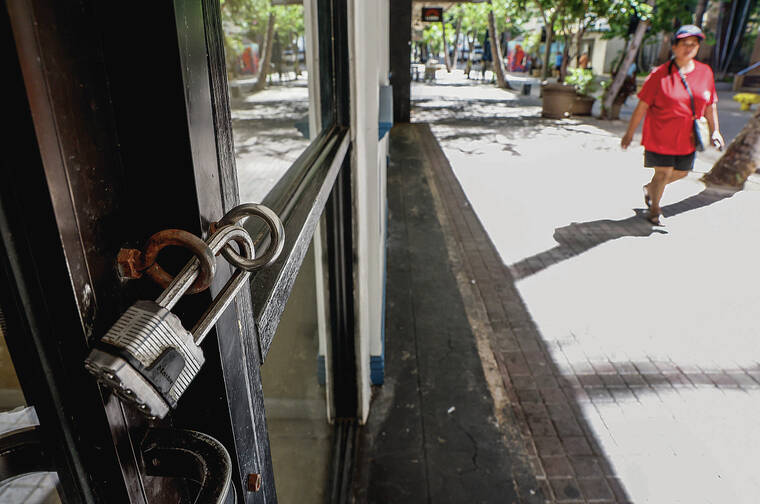By Ian Bauer
Copyright staradvertiser

A new taxing entity involving downtown Honolulu property owners paying into a revamped special improvement district to boost public safety and economic revitalization in an area known for crime, homelessness and shuttered businesses is nearing City Council approval.
The panel’s Zoning and Planning Committee on Tuesday voted unanimously to pass a committee draft of Bill 51 for a third and final Council reading.
The full Council meets at Kapolei Hale on Wednesday.
Bill 51, if adopted, would rename the existing Fort Street Mall Special Improvement District to the Downtown Honolulu Business Improvement District, or BID.
The measure’s passage also would expand the new district’s boundaries to include an area bordered by Nuuanu Avenue, South Beretania Street, Richards Street and Nimitz Highway, the bill indicates. It also would include an adjacent commercial block bounded by Queen, Mililani, Halekauwila and Richards streets.
With an initial term of five years, the new district comes with a management association, governed by either an elected or appointed nonprofit board.
Composed of 20 voting and nonvoting members, the proposed board would include downtown property owners, along with representatives from city agencies, including the Honolulu Police Department, and other community stakeholders, the measure states.
Tyler Dos Santos-Tam — whose Council District 6
includes downtown — introduced Bill 51 in July.
Under the updated plan, nonresidential property owners in the district would contribute to a $1.9 million “first fiscal year” annual budget through special assessments. These funds, according to Dos Santos-Tam, support a visible safety and maintenance presence seven days a week and help coordinate services with HPD and city agencies.
Residential properties in the district would be exempted from the assessment, the measure indicates.
Prior to the latest vote on Bill 51, Zoning Committee Chair Esther Kia‘aina offered amendments to the measure via a new committee draft she has submitted — changes later adopted by the panel.
Kia‘aina’s amendments included granting downtown property owners who currently receive a real property tax exemption under city law, which relates to parcels used for church purposes, exemption from paying special improvement district assessment fees
toward the new BID.
At the meeting, Kekoa McClellan, representing the Roman Catholic Church’s Diocese of Honolulu, thanked the Council for including amendments that would allow the Cathedral Basilica of Our Lady of Peace, built in 1843 at what is now 1175 Fort Street Mall, exemption from special
assessment fees.
“We support the intent of this bill to revitalize the downtown district,” McClellan added. “A safe, clean and vibrant environment is good for all of us, including our parishioners.”
Others, like Chris Fong with Hawaii-based investment firm Tradewind Capital Inc., also approved of Bill 51.
“Downtown Honolulu is really compromised,” he said during a brief PowerPoint presentation that promoted the new BID. “The impression of safety and security is not what it once was, and this has really been exacerbated coming out of COVID.”
He added “we’ve had some major retailers pull out of the district over the last couple of years.”
“So what that tells us is that mainland businesses are really giving up on this district,” Fong said. “But you know, we don’t want to.”
He noted a Downtown
Honolulu BID will “be an effort for the community to step up and support the
district as a whole.”
“And so what the BID does is it will provide safety, security and maintenance personnel,” Fong said. “The ability to clean the streets and power wash the district, and really revitalize the area and take it into our own hands.”
The city backed Bill 51 as well.
“The administration continues to support this community initiative for a special improvement district,” city Managing Director Mike Formby told the committee.
Later, Council member Val Okimoto asked Formby about the city’s ongoing plan to deal with the homeless in the downtown area, “to clean it up and get it safe.”
“The way I would answer that question is that, if the special improvement district is established, the city’s commitment would probably be more than it is now,” Formby replied.
He added “that happens because when the community has boots on the ground, in the district, and can call (the city’s Community Outreach Response and Engagement Team), can call my office … and say, ‘this is what’s happening in the community,’ we can react more quickly than if it goes through the normal process.”
In the case of the Waikiki Business Improvement
District, Formby said “we
actually do more for that community than we do for communities that don’t have these districts.”
“So I think it’s going to be beneficial for us. I think it will help us respond more quickly,” he said. “And I think we can work with the public, part of this public-private partnership, and we can work with the community to respond more quickly.”
But a major downtown area property owner still
opposes the BID.
In written testimony submitted to the Council on Monday, Kevin Crummy, chief investment officer of California–based Douglas Emmett Management LLC, stated the new special improvement district will do nothing to stop homelessness and crime that continue to plague downtown.
“Many of the bill’s proponents, who testified before the City Council, believe that an expanded Business Improvement District (BID) will help alleviate safety issues and homelessness in downtown Honolulu,” Crummy wrote. “However, the existing BID has been in place for over 20 years and has been unable to solve these same problems on Fort Street Mall.”
“Therefore, we do not believe that expanding the BID will result in different outcomes,” he wrote. “We do believe that meaningful reductions in homelessness and crime require the expertise and authority of government-led homelessness prevention services and the Honolulu Police Department. A BID alone simply cannot solve these complex social issues.”
Crummy stated Douglas Emmett “would encourage the proponents to first
revamp the existing BID before undertaking an expansion.”
Kia‘aina responded to Douglas Emmett’s position.
“Never once did I think that we are transferring the government’s responsibility for downtown to the BID,” she said at the meeting. “So I just want to make sure that in creating this it is our intent, of course, for the city administration, the city agencies, as well as the state and federal agencies, to work hand in hand with the BID.”
Kia‘aina then asked Formby to comment on Douglas Emmett’s stance against the BID.
“It’s a public-private partnership and I have stated publicly at the public meetings that we’ve had on this issue that the city does not intend to do less, we intend to do more,” Formby replied. “And that’s actually what’s been proven out in Waikiki.”



